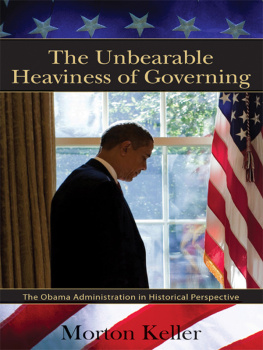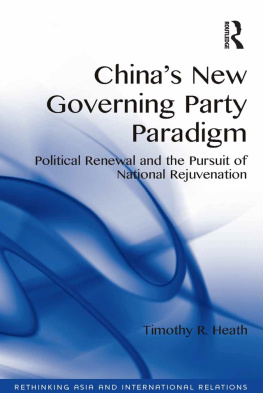First published 1990 by Allen & Unwin
Published 2020 by Routledge
2 Park Square, Milton Park, Abingdon, Oxon OX14 4RN
605 Third Avenue, New York, NY 10017
Routledge is an imprint of the Taylor & Francis Group, an informa business
Andrew Markus 1990
All rights reserved. No part of this book may be reprinted or reproduced or utilised in any form or by any electronic, mechanical, or other means, now known or hereafter invented, including photocopying and recording, or in any information storage or retrieval system, without permission in writing from the publishers.
Notice:
Product or corporate names may be trademarks or registered trademarks, and are used only for identification and explanation without intent to infringe.
National Library of Australia
Cataloguing-in-Publication entry:
Governing savages: the Commonwealth and Aborigines,
19111939
Bibliography
Includes index.
ISBN 0 04 442150 8.
[1.] Aborigines, Australian Government relations. [2.]
Aborigines, Australian Soial conditions. I. Title.
305.89915
ISBN-13: 9780044421504 (pbk)
The research for this book was made possible by the support of the Australian Research Grants Scheme. Over the years it has taken to bring the project to completion assistance in various forms was provided by the Riverina College of Advanced Education and Monash University. Support was also provided by the North Australian Research Unit of the Australian National University and archivists and librarians in Canberra, Darwin, Sydney, Melbourne, Adelaide and Brisbane. For assistance with pictorial material I wish especially to acknowledge Mrs Chris Torlach of the Northern Territory Conservation Commission, Alice Springs, and Ms Carol Cooper of the Australian Institute of Aboriginal Studies. Bain Attwood commented on the final draft of the manuscript and John Iremonger and Fiona Inglis of Allen and Unwin gave generous support in the production of the book.
The interest awakened during the late 1960s in the history of white-Aboriginal relations was at first primarily concerned with frontier conflict in colonial Australia. In the 1980s attention began to shift to more recent developments: this book is part of the new direction, the systematic study of relations following the period of dispossession. Various emphases have been evident in the writing on Aborigines: until recent times the focus was on the actions and motivations of the Europeans, with hardly a passing reference to Aboriginal perspectives. Not surprisingly, such an approach is now disdained, but attempts to redress the balance face the major problem of inadequate sources, although, as this book demonstrates, some written records for the first half of the twentieth century survive.
Those wishing to document Aboriginal perspectives in northern Australia, which until the post-war period lacked Aboriginal populations utilising the written communication of the whites, must place almost total reliance on oral recollections. In addition to the usual problems of assessing the reliability of oral history, notably the problem that such evidence represents a filtering of the past through the present by the informant, there is an additional complication: because of the harsh conditions of life for Aborigines in outback Australia the survivors from the early decades of the twentieth century may not be typical or representative both in terms of their experience and their values, simply by virtue of having survived. This, however, is a counsel for caution, not a call for the abandonment of oral sources. To date oral history of Aboriginal-white relations has been presented mainly in the form of full or fragmentary autobiographies, often with the editorial assistance of white scholars. There have been few attempts by historians to bring together both written and oral material, the most notable exception being Ann McGraths Born in the Cattle: Aborigines in Cattle Country.
This book, while concerned with the twentieth century, reflects the older tradition of studies of the attitudes and behaviour of the superordinate group, the whites, although in the final chapter it discusses the attempts of Aborigines to influence directly the white political process. It is concerned with the impact of the actions of Europeans and for much of the book Aborigines appear through the eyes of outsiders. The book does not examine Aboriginal orientations and understandings unknown or little understood by the whites; it is not the task here to explore the ways in which Aborigines in the north sought to control their destiny, and gain solace and comfort in their lives, under the oppressive conditions which confronted them. The justification for the approach adopted is that there are still fundamental questions to be answered concerning the circumstances which shaped the life-chances of Aborigines, questions which can be dealt with only through a Eurocentric approach using traditional written sources.
It is well known that the expectation of white Australians in the first decades of the century was that Aborigines would become extinct as a race of people. This study, which is concerned primarily with the Northern Territory, sets out to investigate whether the view of inevitable extinction was merely a passive observation, simply an idea in the minds of white Australians, or whether it served to inform and guide policy, providing the basis and rationale for actions designed to ensure that the Aborigines would indeed die out. A second focus is the nature and treatment of Aborigines at sites of contact with white Australians. While not pretending to be exhaustive- a major gap is coverage of Aborigines in towns, particularly Darwin, where they were employed as domestic servants and in a range of menial occupations - the book does address a range of contact situations with agents of the government, in the pastoral industry and on missions.
A third issue, which occupies the major portion of the study, is the exploration of the value system which provided the justification for treatment of Aborigines. Values are analysed from the perspectives of contemporary academics, popular writers, and those with direct influence over the lives of Aborigines - pastoralists, missionaries, politicians, judges and public servants. The final issue concerns the process of change, the struggle to establish a new paradigm for race relations. Although in the inter-war period racism was, if anything, becoming more entrenched in Australian society, the first signs of a concerted challenge to the dominant value system were apparent in the late 1920s and by the next decade the new approach was clearly and forcefully articulated. Those mounting this challenge included Protestant clerics and other white humanitarians, Aboriginal activists, and of major significance in terms of impact on policy, the leading Australian anthropologist. These people sought to establish that the Aborigines were not subhuman and that there was prospect for adaptation to a new way of life. The path to the future was through understanding Aboriginal society. At the end of the 1930s a change in the definition of expert was underway, from one who knew the Aborigines through personal contact and observation, from first hand experience of conditions of life in the outback, to the expert whose knowledge was based on theoretical study and systematic anthropological research.









